Neeraj
Semantic Search and Recommendation Algorithm
Dec 09, 2024



Abstract:This paper introduces a new semantic search algorithm that uses Word2Vec and Annoy Index to improve the efficiency of information retrieval from large datasets. The proposed approach addresses the limitations of traditional search methods by offering enhanced speed, accuracy, and scalability. Testing on datasets up to 100GB demonstrates the method's effectiveness in processing vast amounts of data while maintaining high precision and performance.
A Deep Learning Framework for COVID Outbreak Prediction
Oct 07, 2020



Abstract:The outbreak of COVID-19 i.e. a variation of coronavirus, also known as novel corona virus causing respiratory disease is a big concern worldwide since the end of December 2019. As of September 12, 2020, it has turned into an epidemic outbreak with more than 29 million confirmed cases and around 1 million reported deaths worldwide. It has created an urgent need to monitor and forecast COVID-19 spread behavior to better control this spread. Among all the popular models for COVID-19 forecasting, statistical models are receiving much attention in media. However, statistical models are showing less accuracy for long term forecasting, as there is high level of uncertainty and required data is also not sufficiently available. In this paper, we propose a comparative analysis of deep learning models to forecast the COVID-19 outbreak as an alternative to statistical models. We propose a new Attention-based encoder-decoder model, named Attention-Long Short Term Memory (AttentionLSTM). LSTM based neural network layer architecture incorporates the idea of fine-grained attention mechanism i.e., attention on hidden state dimensions instead of hidden state vector itself, which is capable of highlighting the importance and contribution of each hidden state dimension. It helps in detection on crucial temporal information, resulting in a highly interpretable network. Additionally, we implement a learnable vector embedding for time. As, time in a vector representation can be easily added with many architectures. This vector representation is called Time2Vec. We have used COVID-19 data repository by the Center for Systems Science and Engineering (CSSE) at Johns Hopkins University to assess the proposed model's performance. The proposed model give superior forecasting accuracy compared to other existing methods.
 Add to Chrome
Add to Chrome Add to Firefox
Add to Firefox Add to Edge
Add to Edge